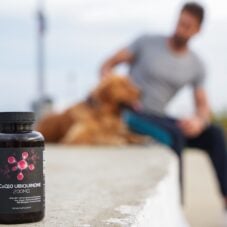Antioxidants
10 Benefits of CoQ10 Supplements Supported by Research
You’ve come to the right place if you’re looking for a supplement that energizes your cells. In this blog post, we’ll explore the top ten benefits of CoQ10 supplements. Scientific research genuinely supports these benefits, not just anecdotal evidence.
Before we begin, we should mention that most CoQ10 studies use Ubiquinone (the oxidized form of CoQ10), not Ubiquinol. Ubiquinone is stable and less expensive to produce, thus more affordable for researchers to use in studies.1
With that said, check out these ten science-backed benefits of taking CoQ10 supplements (such as our 200mg CoQ10 Ubiquinone softgels):
Table of Contents
Benefit no. 1 – CoQ10 is a natural energy booster and may help reduce fatigue
CoQ10 helps the mitochondria produce energy. The mitochondria are known as the “cell’s powerhouse”, with each cell containing 100’s or even 1000’s of these microscopic organelles (exceptions are red blood cells).2
CoQ10’s role in mitochondrial health and cellular energy is critical. Unsurprisingly, decreased CoQ10 levels are associated with tiredness and fatigue. Fortunately, one of the benefits of CoQ10 supplementation is that it may help improve energy levels.
This benefit is supported by Tsai et al.’s meta-analysis of 13 studies that looked at more than 1000 subjects (both healthy and sick). They found that those who took CoQ10 at higher doses (they ranged from 30mg to 500mg/day) for longer periods experienced less tiredness and fatigue.3
Benefit no. 2 – CoQ10 may help with heart health
CoQ10 exists in high concentrations within the mitochondria of heart muscle cells. Low levels of CoQ10 is associated with heart problems. In fact, it’s estimated that 3 out of 4 heart disease patients have low CoQ10 levels.4
Studies point to CoQ10 supplementation as being beneficial for heart health. According to Ruiz et al., CoQ10 may help lower the risk of death from heart-related issues by:5
- Improving the results for people getting heart bypass surgery.
- Preventing the buildup of harmful fats in blood vessels.
- Lowering high blood pressure and making blood vessels more flexible.
- Increasing the nitric oxide levels for vasodilation (widening of blood vessels), thereby helping to lower blood pressure.
Benefit no. 3 – CoQ10 may boost performance and endurance in sports

Research suggests that CoQ10 supplementation may be valuable for optimizing exercise performance.
For instance, its antioxidant activity may help counteract the production of free radicals during exercise. Moreover, it may also help speed up exercise recovery by reducing exercise-induced muscle damage and inflammation.6
Benefit no. 4 – CoQ10 may effectively lower blood pressure
A meta-analysis of 12 clinical trials found that CoQ10 supplementation helped lower hypertensive patients’ systolic blood pressure by up to 17 mmHg and up to 10 mmHg for diastolic blood pressure.7
These numbers are significant because every 5 mmHg reduction in systolic blood pressure lowers the risk for heart problems, such as:8
- 10% lower risk of developing major cardiovascular disease
- 13% lower risk of stroke and heart failure
- 8% lower risk of coronary heart disease
- 5% lower risk of death from cardiovascular disease
Benefit no. 5 – CoQ10 may help boost immune health
CoQ10 is also found in the mitochondria of our immune cells, contributing to many immune functions. This includes reducing inflammation and supporting the immune system’s response to infection.9
Studies have found that patients sick with the flu had significantly lower levels of CoQ10 compared to their healthy peers.10 11
Similarly, CoQ10 supplementation also helped reduce the severity of Covid-19 infection, thus decreasing the need for hospitalization.12
Additionally, taking 200mg of CoQ10 daily for at least 2 weeks may help speed up recovery from pneumonia.13
Benefit no. 6 – CoQ10 may help maintain healthy cholesterol levels
High levels of bad cholesterol (LDL) increase your risk for heart disease. This is because LDL cholesterol can build up on the walls of blood vessels, causing them to become narrow or even blocked.14
But there’s good news from Liu et al. A daily CoQ10 dose of 400-500mg may help:15
- Decrease LDL (bad) cholesterol levels
- Increase HDL (good) cholesterol levels
- Decrease Total cholesterol levels
Typically, medications aimed at lowering cholesterol levels are the first choice for treatment. They work by reducing cholesterol production in the liver and helping the body remove excess cholesterol.16 However, they have serious side effects, bringing us to the next CoQ10 benefit below.
Benefit no. 7 – CoQ10 may help with medication-induced myopathy
Some cholesterol-lowering medications can cause myopathy, a muscle disorder leading to pain, weakness, nighttime cramping, tendon discomfort, and fatigue.17 Additionally, individuals on these medications are often found to have lower levels of CoQ10.18
In a meta-analysis of 12 studies with 575 patients total, CoQ10 supplementation helped reduce muscle pain, weakness, cramps, and fatigue. However, there was no evidence that CoQ10 reduced plasma creatine kinase levels, a marker of muscle damage.19
Benefit no. 8 – CoQ10 may help regulate blood sugar levels
Patients with type 2 diabetes have low levels of CoQ10. However, studies show that CoQ10 supplementation may help improve glycemic control by decreasing HbA1c and fasting blood glucose levels.20
The same improvements were also experienced by patients with diabetic nephropathy (a kidney disease). A daily 100mg dose of CoQ10 for 12 weeks led to improved HbA1c levels and insulin sensitivity.21
Benefit no. 9 – CoQ10 supplementation may help with cognitive function
Lower CoQ10 levels in older adults is associated with cognitive decline. Also, older adults with heart failure who had low CoQ10 levels had issues with their executive functions, including impaired attention.22
Fortunately, maintaining healthy CoQ10 levels, physical activity, and good nutrition may help improve cognitive and executive functions in older adults.23
Benefit no. 10 – CoQ10 benefits may include fertility support
CoQ10 plays a crucial role in mitochondrial function and fertility in older women. It may also help reverse age-related decline in egg cell quality and quantity.24
Moreover, a recent meta-analysis of 5 studies with 449 infertile women undergoing assisted reproduction reported that CoQ10 helped increase clinical pregnancy rates from 14.1% to 28.8%! Dosages ranged from 180mg to 1,200mg daily. 25
Conclusion
The best CoQ10 supplements offer a range of scientifically supported benefits, including increased energy, improved performance, heart health support, lower blood pressure, enhanced immunity, and more. These findings make CoQ10 a valuable addition to your dietary regimen, promoting overall health and well-being. That said, it’s important to consult your doctor before adding CoQ10 to your supplement routine.
💬 Something on your mind? Share your thoughts in the comments. We love hearing from curious minds.
📩 And while you’re here, join our newsletter for more smart stuff (and secret perks)!
References:
- Madsen, B. “Ubiquinone or Ubiquinol – Does It Really Matter?” Healthandscience.eu, icqaproject.org/wp-content/uploads/bsk-pdf-manager/22_10_GB_UBIQINOL_UNIQINOL_FACTSHEET_A4_1014-2.PDF. ↩︎
- Robin, Eugene D., and Ronald Wong. “Mitochondrial DNA Molecules and Virtual Number of Mitochondria per Cell in Mammalian Cells.” Journal of Cellular Physiology, vol. 136, no. 3, Sept. 1988, pp. 507–513, https://doi.org/10.1002/jcp.1041360316. ↩︎
- Tsai, I-Chen, et al. “Effectiveness of Coenzyme Q10 Supplementation for Reducing Fatigue: A Systematic Review and Meta-Analysis of Randomized Controlled Trials.” Frontiers in Pharmacology, vol. 13, 24 Aug. 2022, p. 883251, www.ncbi.nlm.nih.gov/pmc/articles/PMC9449413/ ↩︎
- Kumar, Adarsh, et al. “Role of Coenzyme Q10 (CoQ10) in Cardiac Disease, Hypertension and Meniere-like Syndrome.” Pharmacology & Therapeutics, vol. 124, no. 3, Dec. 2009, pp. 259–268, https://doi.org/10.1016/j.pharmthera.2009.07.003. ↩︎
- Rabanal-Ruiz, Yoana, et al. “The Use of Coenzyme Q10 in Cardiovascular Diseases.” Antioxidants, vol. 10, no. 5, 1 May 2021, p. 755, www.mdpi.com/2076-3921/10/5/755/htm ↩︎
- Drobnic, Franchek, et al. “Coenzyme Q10 Supplementation and Its Impact on Exercise and Sport Performance in Humans: A Recovery or a Performance-Enhancing Molecule?” Nutrients, vol. 14, no. 9, 26 Apr. 2022, p. 1811, https://doi.org/10.3390/nu14091811. ↩︎
- Rosenfeldt, F. L., et al. “Coenzyme Q10 in the Treatment of Hypertension: A Meta-Analysis of the Clinical Trials.” Journal of Human Hypertension, vol. 21, no. 4, 1 Apr. 2007, pp. 297–306, pubmed.ncbi.nlm.nih.gov/17287847/ ↩︎
- Rahimi, Kazem, et al. “Pharmacological Blood Pressure Lowering for Primary and Secondary Prevention of Cardiovascular Disease across Different Levels of Blood Pressure: An Individual Participant-Level Data Meta-Analysis.” The Lancet, vol. 397, no. 10285, May 2021, pp. 1625–1636, https://doi.org/10.1016/s0140-6736(21)00590-0. ↩︎
- Mantle, David, et al. “Coenzyme Q10 and Immune Function: An Overview.” Antioxidants, vol. 10, no. 5, 1 May 2021, p. 759, www.mdpi.com/2076-3921/10/5/759 ↩︎
- Chase, Maureen, et al. “Coenzyme Q10 in Acute Influenza.” Influenza and Other Respiratory Viruses, vol. 13, no. 1, 1 Jan. 2019, pp. 64–70, pubmed.ncbi.nlm.nih.gov/30156030/ ↩︎
- Kelekçi, S., et al. “The Relationships between Clinical Outcome and the Levels of Total Antioxidant Capacity (TAC) and Coenzyme Q (CoQ 10) in Children with Pandemic Influenza (H 1 N1) and Seasonal Flu.” European Review for Medical and Pharmacological Sciences, vol. 16, no. 8, 1 Aug. 2012, pp. 1033–1038, pubmed.ncbi.nlm.nih.gov/22913153/. ↩︎
- Israel, Ariel, et al. “Identification of Drugs Associated with Reduced Severity of COVID-19: A Case-Control Study in a Large Population.” MedRxiv, 24 Mar. 2021, p. 2020.10.13.20211953, www.ncbi.nlm.nih.gov/pmc/articles/PMC7574266/ ↩︎
- Farazi, Aliasghar, et al. “Coenzyme Q10 Administration in Community-Acquired Pneumonia in the Elderly.” Iranian Red Crescent Medical Journal, vol. 16, no. 12, 1 Dec. 2014, www.ncbi.nlm.nih.gov/pmc/articles/PMC4341326/ ↩︎
- Centers for Disease Control and Prevention. “LDL & HDL: Good & Bad Cholesterol.” Centers for Disease Control and Prevention, 31 Oct. 2017, www.cdc.gov/cholesterol/ldl_hdl.htm ↩︎
- Liu, Zhihao, et al. “Effects of Coenzyme Q10 Supplementation on Lipid Profiles in Adults: A Meta-Analysis of Randomized Controlled Trials.” The Journal of Clinical Endocrinology and Metabolism, vol. 108, no. 1, 7 Oct. 2022, pp. 232–249, https://doi.org/10.1210/clinem/dgac585 ↩︎
- Brinton, Eliot A. “Understanding Patient Adherence and Concerns with STatins and MedicatION Discussions with Physicians (ACTION): A Survey on the Patient Perspective of Dialogue with Healthcare Providers Regarding Statin Therapy.” Clinical Cardiology, vol. 41, no. 6, June 2018, pp. 710–720, https://doi.org/10.1002/clc.22975. ↩︎
- Sathasivam, S., and B. Lecky. “Statin Induced Myopathy.” BMJ, vol. 337, no. nov06 3, 6 Nov. 2008, pp. a2286–a2286, https://doi.org/10.1136/bmj.a2286. ↩︎
- Hargreaves, Iain, et al. “Disorders of Human Coenzyme Q10 Metabolism: An Overview.” International Journal of Molecular Sciences, vol. 21, no. 18, 13 Sept. 2020, p. 6695, https://doi.org/10.3390/ijms21186695. ↩︎
- Qu, Hua, et al. “Effects of Coenzyme Q10 on Statin‐Induced Myopathy: An Updated Meta‐Analysis of Randomized Controlled Trials.” Journal of the American Heart Association, vol. 7, no. 19, 2 Oct. 2018, https://doi.org/10.1161/jaha.118.009835. ↩︎
- Zhang, Shi-ying, et al. “Effectiveness of Coenzyme Q10 Supplementation for Type 2 Diabetes Mellitus: A Systematic Review and Meta-Analysis.” International Journal of Endocrinology, vol. 2018, 16 Sept. 2018, www.ncbi.nlm.nih.gov/pmc/articles/PMC6165589/ ↩︎
- Gholnari, Tahereh, et al. “The Effects of Coenzyme Q10 Supplementation on Glucose Metabolism, Lipid Profiles, Inflammation, and Oxidative Stress in Patients with Diabetic Nephropathy: A Randomized, Double-Blind, Placebo-Controlled Trial.” Journal of the American College of Nutrition, vol. 37, no. 3, 7 Nov. 2017, pp. 188–193, https://doi.org/10.1080/07315724.2017.1386140. ↩︎
- Kure, Christina E., et al. “Relationships among Cognitive Function and Cerebral Blood Flow, Oxidative Stress, and Inflammation in Older Heart Failure Patients.” Journal of Cardiac Failure, vol. 22, no. 7, July 2016, pp. 548–559, https://doi.org/10.1016/j.cardfail.2016.03.006. ↩︎
- Fernández-Portero, Cristina, et al. Coenzyme Q10 Levels Associated with Cognitive Functioning and Executive Function in Older Adults. Vol. 78, no. 1, 31 July 2022, pp. 1–8, https://doi.org/10.1093/gerona/glac152. ↩︎
- Ben-Meir, Assaf, et al. “Coenzyme Q10 Restores Oocyte Mitochondrial Function and Fertility during Reproductive Aging.” Aging Cell, vol. 14, no. 5, 1 Oct. 2015, pp. 887–895, pubmed.ncbi.nlm.nih.gov/26111777/ ↩︎
- Florou, Panagiota, et al. “Does Coenzyme Q10 Supplementation Improve Fertility Outcomes in Women Undergoing Assisted Reproductive Technology Procedures? A Systematic Review and Meta-Analysis of Randomized-Controlled Trials.” Journal of Assisted Reproduction and Genetics, 7 Aug. 2020, https://doi.org/10.1007/s10815-020-01906-3. ↩︎




